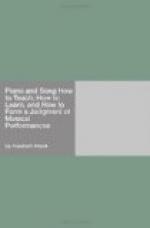Cautions.
I warn pianists, and others also, in playing:
1. Against any showy and unsuitable display. Why should you wish to attract attention, and to create an effect by foppishness and all sorts of grimaces, or by curious and marvellous exhibitions of virtuoso-ship? You have only to play musically and beautifully, and to deport yourselves with modesty and propriety. Direct your whole attention to the business in hand,—that is, to your performance; and endeavor to secure for it the interest of the public, who are so easily rendered inattentive. We want no more public performances from eccentric geniuses.
2. Do not devote yourself exclusively to pieces calculated to show the skill of the performer. Why desire always to show off your power in octave passages, your trills, your facility in skips, your unprecedented stretches, or other fantastic feats? You only produce weariness, satiety, and disgust, or, at least, you make yourselves ridiculous.
3. Play good music in a musical and rational manner. The public are tired of hearing Potpourris, made up of odds and ends, tedious Etudes, Rhapsodies, Fantasias without fancy, dismal monotonies and endless, cheap, silly cadences that mean nothing. Learn to understand the age, and the world in which you live.
4. Do not make yourselves ridiculous by new inventions in piano-playing. I mention, for example, one of the most foolish affectations of modern times. You try to quiver on a note, just as violin and ’cello players are unfortunately too much inclined to do. Do not expose yourselves to the derision of every apprentice in piano manufacture. Have you no understanding of the construction of the piano? You have played upon it, or have, some of you, stormed upon it, for the last ten years; and yet you have not taken pains to obtain even a superficial acquaintance with its mechanism. The hammer, which by its stroke upon the string has produced the sound, falls immediately when the tone resounds; and after that you may caress the key which has set the hammer in motion, fidget round on it as much as you please, and stagger up and down over it, in your intoxicated passion,—no more sound is to be brought out from it, with all your trembling and quivering. It is only the public who are quivering with laughter at your absurdity.
5. Give up the practice of extreme stretches. Widely dispersed harmonies may sometimes produce a good effect, but not by too frequent and too eager an employment of them at every opportunity. Even the greatest beauties in art can lead to mannerism, and this again to one-sidedness. Art should be many-sided, and you must never produce the impression that you are inclined to make the means an end. I beg you to reflect that too much practice of very wide stretches enfeebles the muscles and the power of the hand and fingers, endangers an even, sound touch, and makes the best style of playing a doubtful acquisition. Teachers ought therefore to use great prudence, and only gradually to permit their pupils, especially young girls, to practise great extensions and wide stretches. To learn to be able to strike ten notes is quite enough.




